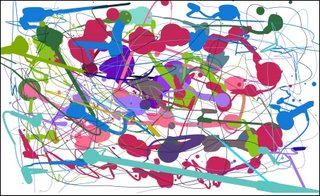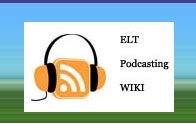This is a short video including an interview with my nephew, Matt Hanson, who organized a 12-hour memorial at William & Mary College for the victims of 9-11.
911 Memorial
Interesting that the younger generation is communicating to the world through YouTube.
Monday, September 25, 2006
Friday, September 15, 2006
Revver.com
I've been thinking of mentioning this site for some time, but Nicolas Gromik's video convinced me to look it up again--it is a beautiful huge viewer, and the films can be downloaded from the site as well. (I assume the creator selects whether or not to allow this.
Here is the direct link to Gromik's vlog, hutong2
Here is the direct link to Gromik's vlog, hutong2

Thursday, September 14, 2006
Talkr
Have you noticed the iPod icon at the bottom of each post? I've been trying to get Talkr to speak my podcasts, but it hasn't worked yet. This is the latest in a long line of trials.
--Elizabeth
--Elizabeth
Your Jackson Pollock

This is another site on the theme of what you can do with art online. To make your own Jackson Pollock, click to start, and swoosh and swirl. Each time you click the paint changes colors.
Mr. Picasso Head
Photos for Peace

This is a great collection of photographs from around the world by Peace Corps volunteers, posted at the Cote d'Ivoire's American Embassy site. They might be used for an intercultural project or to explore other countries' land and peoples.
Friday, September 08, 2006
Radio Children
Radio Children is a podcast made by children for children, with support from a variety of British museums. Educational and attractive.
(Thanks to Graham Stanley, podcaster supreme, for this tip.)
(Thanks to Graham Stanley, podcaster supreme, for this tip.)
The Freesound Project
The Freesound Project sounds like it would be well worth joining.
From their site:
Freesound is also looking for institutional help with sound files and mirror/server space.
From their site:
The Freesound Project aims to create a huge collaborative database of audio snippets, samples, recordings, bleeps, ... released under the Creative Commons Sampling Plus License. The Freesound Project provides new and interesting ways of accessing these samples, allowing users to
* browse the sounds in new ways using keywords, a "sounds-like" type of browsing and more
* up and download sounds to and from the database, under the same creative commons license
* interact with fellow sound-artists!
We also aim to create an open database of sounds that can also be used for scientific research. Many audio research institutions have trouble finding correctly licensed audio to test their algorithms. Many have voiced this problem, but so far there hasn't been a solution.
How can you help?
If you have audio samples which can be released under the Creative Commons Sampling Plus License please add them! Label them correctly and help us build a huge database.
Note we are not looking for songs, or compositions. We are looking for sounds. Field recordings, kit recordings, generated sounds, ... as long as the sounds are not copyrighted (in a non-compatible way) or if the sounds are made by yourself and you want to release them under the Creative Commons Sampling Plus License.
Freesound is also looking for institutional help with sound files and mirror/server space.
Wednesday, September 06, 2006
IPod U.
Here are three universities using iPod technology to deliver content, e.g. lectures, language practice, videos that are too long to view in class, etc.:
UC Berkeley webcast.berkeley
Stanford
Duke Digital Initiative
UC Berkeley webcast.berkeley
Stanford
Duke Digital Initiative
Why do project-based learning?
I've been meaning to reference this for a long time--
Why do project-based learning? The Multimedia Project: Project-based Learning with Multimedia. San Mateo County Office of Education. 1997-2001. 17 June 2006.
The whole PBL WebRing collection of sites is very helpful in defining collaborative tasks. There are rubrics for assessing creative projects, suggested lesson plans, models, et al.
Why do project-based learning? The Multimedia Project: Project-based Learning with Multimedia. San Mateo County Office of Education. 1997-2001. 17 June 2006.
The whole PBL WebRing collection of sites is very helpful in defining collaborative tasks. There are rubrics for assessing creative projects, suggested lesson plans, models, et al.
Monday, September 04, 2006
Address Book Widget
I don't know how useful (or dangerous) this widget might be, but added to any Web page, it will allow the user to look up their own address book in one of a dozen or so services (like Yahoo!), in order to send a quick email to someone, e.g., to send your Web page address to a friend.
Would this create a privacy or spam problem?
Plaxo Address Book Widget
Would this create a privacy or spam problem?
Plaxo Address Book Widget
Mandarin Design

I've been having a lot of fun with Mandarin Design, working out "opacity," getting my feet wet in CSS, and trying out banners and logos. The site has nice links to other sites with more on creating interesting Web designs. This is a logo for my consulting company, Computers for Education, based on a design in Typogenerator, linked from Mandarin. What you get is very seredipitous.
Friday, September 01, 2006
iPods for Teaching and Learning FLs

Integrating ICT into the Modern Foreign Language Classroom with iPods
The languages faculty at Duke University in Durham, North Carolina has been experimenting with the use of iPods to enhance teaching and learning since 2004 as part of The Duke Digital Initiative. . . .
The mobility of listening comprehension activities and recording capabilities has opened up new avenues for language students and instructors.
This is a way cool site with numerous links to descriptions of the Duke project, tips on using technology for language learning, etc. To quote further from their frontpage:
The iPods are used by the students and professors in the following ways:
The students:
* listen to audio clips based on their workbook and textbook as well as dramatic recordings of four short 'novellas'
* read text files which accompany the audio material to further improve their comprehension
* record dialogues and keep a weekly 'oral diary' using an attached microphone
* explore the use of Spanish language podcasts
* interview native speakers
The professors:
* record feedback on compositions and oral exams
* create an iTunes playlist including Spanish language songs used to reinforce grammar, functions and vocabulary in class
* make weekly recordings called 'audio flashcards' which are designed to revise vocabulary and review pronunciation
* monitor students' progress in speaking Spanish
* record native Spanish speakers of different backgrounds reading the course literature
Absolutely Intercultural podcast
This is a great new wiki space that combines the advantages of quick Web page editing and podcasting.
There is also a lovely, very detailed lesson plan to get started with intercultural podcasting. A great idea from our friends at the British Council (thanks for the tip, Graham Stanley):

Absolutely Intercultural podcast
From their site:
There is also a lovely, very detailed lesson plan to get started with intercultural podcasting. A great idea from our friends at the British Council (thanks for the tip, Graham Stanley):

Absolutely Intercultural podcast
From their site:
Absolutely Intercultural is the first podcast in the world to deal with intercultural issues. We’ll be releasing a new episode every second Friday evening, looking at all intercultural aspects of human intercultural communication.
Subscribe to:
Comments (Atom)

